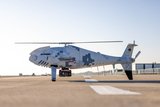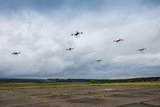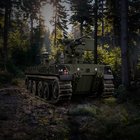Boeing to demonstrate UAV cooperative control technologies for US Air Force
The Boeing Company has received a three-year, $9.8 million contract from the US Air Force Research Laboratory to further develop and demonstrate technologies that will enable multiple small unmanned aerial vehicles to coordinate with each other and a manned airborne control station to more safely and effectively carry out intelligence, surveillance and reconnaissance missions.
The Foxhunt Multi-Small Unmanned Aerial System Cooperative Control Demonstration will leverage Boeing's networked systems expertise and technology advancements to directly support an emerging and challenging US Air Force need.
"The focus of the Foxhunt program is the airborne control of a varied mix of unmanned aerial vehicles," said Patrick Stokes of Boeing Research & Technology, the company's advanced, central research, technology and innovation organization, who will manage the research effort. "It's part of a grander vision outlined by the Air Force Research Laboratory to include the air launch, command-and-control and airborne recovery of unmanned aerial systems - all from an airborne mothership."
Stokes said the unmanned aerial systems are intended to be an extension of the manned mothership's sensor and weapon suites, improving situational awareness and intelligence, as well as surveillance and reconnaissance reach, allowing for safer stand-off distances.
The team working on this effort includes researchers from the Boeing Research & Technology and Boeing Test & Evaluation groups of Boeing's Engineering, Operations & Technology organization; Boeing Defense, Space & Security's Phantom Works organization; and Insitu, a wholly owned independent Boeing subsidiary. Jonathan How, a renowned researcher from the Massachusetts Institute of Technology in the area of unmanned aerial vehicle cooperative planning, also is on the team.
"This research project is a good fit within Boeing's overall research-and-technology strategy," said Jim Paunicka, a Boeing Technical Fellow and the program's principal investigator. "It supports research and technology roadmaps in many Boeing programs, helping to further the development of technologies involving airborne communications and networking, unmanned aerial systems, control station architecture, multi-mission planning, and command-and-control."
Source: Boeing
More from Uncrewed Vehicles
-
![Ready for the race: Air separation drone swarms vs. air defence systems]()
Ready for the race: Air separation drone swarms vs. air defence systems
As the dynamics of aerial combat rapidly evolve, Chinese scientists have engineered a sophisticated air separation drone model that can fragment into up to six drones, each capable of executing distinct battlefield roles and challenging the efficacy of current anti-drone defences such as the UK’s Dragonfire laser system.
-
![Israel’s MALE UAVs ‘must adapt’ to Iranian-made air defences]()
Israel’s MALE UAVs ‘must adapt’ to Iranian-made air defences
Advancements in air defence technologies have begun to reshape aerial combat dynamics in the Middle East, as illustrated by recent events involving the Israeli Air Force and Hezbollah.
-
![Hundreds more UAS sent to Ukraine forces with thousands more on the way]()
Hundreds more UAS sent to Ukraine forces with thousands more on the way
Both sides of the Russia-Ukraine war have been using UAS for effective low-cost attacks, as well as impactful web and social media footage. Thousands more have now been committed to Ukrainian forces.
-
![AI and software companies selected for US Army Robotic Combat Vehicle subsystems]()
AI and software companies selected for US Army Robotic Combat Vehicle subsystems
The US Army has intentions to develop light, medium and heavy variants of the Robotic Combat Vehicle (RCV) as part of the branche’s Next Generation Combat Vehicle family.
-
![DroneShield to improve software of DroneSentry-X C-UAS system under new contract]()
DroneShield to improve software of DroneSentry-X C-UAS system under new contract
DroneSentry-X, a cross-vehicle compatible, automated 360° C-UAS detect and defeat device, can offer 360° awareness and protection using integrated sensors. According to its manufacturer, it is suitable for mobile operations, on-site surveillance and on-the-move missions.
-
![Ukraine takes delivery of new indigenous C-UAS systems]()
Ukraine takes delivery of new indigenous C-UAS systems
Funded by the country’s former president, the new C-UAS systems will be sent to the frontline where they have already been tested against Russian invading forces.


























